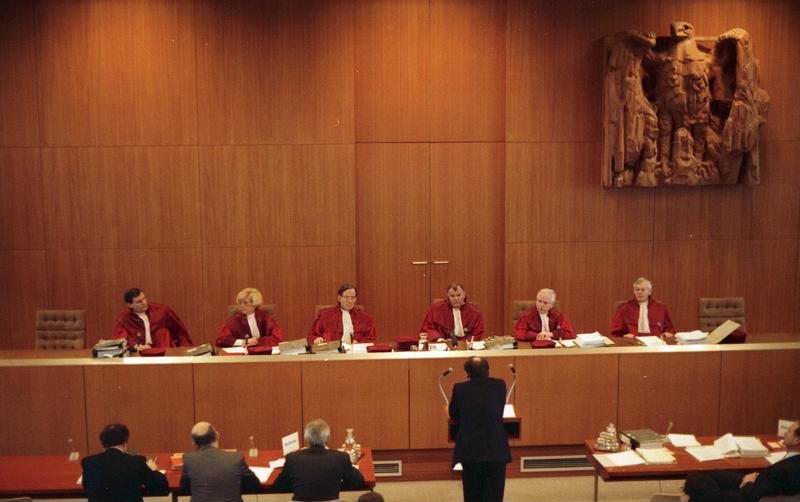From organisational to substantive criteria
Over the past few months, German prosecutors have cautiously embarked on new paths to bring to justice crimes committed in the Syrian Civil War. Like most of their European counterparts, German investigators had so far remained focused on offences against counter-terrorism provisions (codified in Germany under §§129a and b of the country’s criminal code).1
Consequently, until now verdicts were based on charges of terrorist conspiracy (Bildung einer terroristischen Vereinigung) and thus on purely formalistic criteria: what was penalised was only the formation or support of a terrorist association, not the substantive rights violations that perpetrators had committed in the Syrian war zone.
However, amidst the increasing rates of the return of German foreign fighters – of the more than 750 that have made their way to Syria, more than 250 returned2– and against the backdrop of the growing number of Syrian refugees in the country, prosecutors are apparently seeking to enable more ambitious judicial proceedings taking the commission of international crimes – violations of fundamental human rights and of international humanitarian law – into account.
The case of Aria L.
In July 2016, the German national Aria L. was sentenced to two years imprisonment for war crimes by the Higher Regional Court in Frankfurt. Having travelled to Syria in spring 2014, L. had not directly participated as a fighter in the Civil War – at least not to the court’s knowledge. However, pictures of L. posing next to the severed heads of two Syrian government soldiers made their way on to Facebook.3
The Court viewed L.’s actions as fulfilling the criteria for war crimes set out in §8.1.9 of the Code of Crimes against International Law (Völkerstrafgesetzbuch), the code translating the Rome Statute of the International Criminal Court into domestic German law: L. was condemned for having treated a person protected under international humanitarian law – a category which includes enemy forces that are hors de combat – in a gravely degrading manner.4
From foreign fighters to Syrian nationals
Significantly, the Völkerstrafgesetzbuch also contains provisions of universal jurisdiction; i.e. provisions allowing German courts to prosecute genocide, crimes against humanity, and war crimes even if they are committed by foreign citizens abroad. Normally, national courts do not have the authority to adjudicate on acts that have no connection either with the national territory (territorial principle) or with national citizens (principle of nationality).5
Consequently, the code offers the possibility to bring to justice not just ‘foreign fighters’ (German nationals or residents that have travelled to the Middle Eastern theatres of battle) but also Syrian nationals that have sought refuge as asylum-seekers in Germany after having committed international crimes. In fact, at least one trial against a Syrian national is ongoing in front of a German court, and another in preparation. The offences involved include attacks on protected persons, torture, and pillaging.6
Information from within a divided Syrian community
Syrian refugees are by now systematically asked whether they have witnessed crimes against humanity or other offences justiciable under the German code, or whether they can even name perpetrators of such offences. Asylum authorities have sent 25 to 30 tips to prosecutors per day, amounting to over 2000 indications of international crimes over the course of 2015.7
At the same time, some of these tip-offs is either not verifiable, based only on rumour, or reflective of the distrust and recriminations prevailing between different groups fleeing the ravages of the Syrian war. Investigators noted that informants sometimes accused members of other ethnic or religious groups of having perpetrated war crimes without being able to furnish concrete evidence for these claims.8
Challenges of evidence collection
This highlights the challenges involved in the collection and evaluation of testimonies and evidence. These challenges only grow in importance due to the fact that investigators have of course no access to the sites of crimes in Syria. Often, evidence is insufficient for the opening of legal proceedings but substantial enough that suspicions remain, leaving a bitter aftertaste among prosecutors as well as among Syrian human rights groups striving to bring perpetrators of international crimes to justice.9
A related concern is that prosecutions under the provisions of the Völkerstrafgesetzbuch only target a small sub-section of war criminals from the Syrian battlefields. First of all, those responsible for the large-scale orchestration of fundamental rights violations have not left Syria and asked for asylum in Germany – meaning that German prosecutors must confine themselves to go after the small fry only.10
Moreover, there is a concern that the henchmen of Bashar al-Asad will by and large escape judgement under these provisions, since comparatively few of them have asked for asylum in Europe.11 This does not obviate the need to bring to justice fighters and commanders of other factions, above all of the more brutal Islamist and jihadist groups. Yet given the fact that it is still above all the Asad forces that have “shredded the laws of warfare”,12 a failure to prosecute government personnel means a heavily lopsided judicial treatment of the Syrian quagmire.
Thus, while the activation of the substantive provisions of the Völkerstrafgesetzbuch constitutes a step forward compared with the prosecution under the blanket terms of counter-terrorism legislation that punishes a formal status rather than actual offences committed, bringing justice to bear on the perpetrators of international crimes in Syria remains fraught with difficulties.
Sources
https://www.icct.nl/wp-content/uploads/2016/03/ICCT-Report_Foreign-Fighters-Phenomenon-in-the-EU_1-April-2016_including-AnnexesLinks.pdf , pp. 25 f. ↩
https://olg-frankfurt-justiz.hessen.de/irj/OLG_Frankfurt_am_Main_Internet?rid=HMdJ_15/OLG_Frankfurt_am_Main_Internet/nav/d44/d4471596-ad85-e21d-0648-71e2389e4818,3ed60b46-2d1d-d551-d064-8712ae8bad54,,,11111111-2222-3333-4444-100000005004%26_ic_uCon_zentral=3ed60b46-2d1d-d551-d064-8712ae8bad54%26overview=true.htm&uid=d4471596-ad85-e21d-0648-71e2389e4818 ↩
https://olg-frankfurt-justiz.hessen.de/irj/OLG_Frankfurt_am_Main_Internet?rid=HMdJ_15/OLG_Frankfurt_am_Main_Internet/nav/d44/d4471596-ad85-e21d-0648-71e2389e4818,3ed60b46-2d1d-d551-d064-8712ae8bad54,,,11111111-2222-3333-4444-100000005004%26_ic_uCon_zentral=3ed60b46-2d1d-d551-d064-8712ae8bad54%26overview=true.htm&uid=d4471596-ad85-e21d-0648-71e2389e4818 ↩
http://www.ejiltalk.org/justice-for-syria-opportunities-and-limitations-of-universal-jurisdiction-trials-in-germany/ ↩
http://www.abc.net.au/news/2016-05-01/refugee-influx-spurs-germany-to-tackle-syrian-war-crimes/7374152 , http://www.ejiltalk.org/justice-for-syria-opportunities-and-limitations-of-universal-jurisdiction-trials-in-germany/ ↩
https://www.tagesschau.de/inland/kriegsverbrechen-101.html ↩
https://www.tagesschau.de/inland/kriegsverbrechen-101.html ↩
http://www.ejiltalk.org/justice-for-syria-opportunities-and-limitations-of-universal-jurisdiction-trials-in-germany/ ↩
http://www.abc.net.au/news/2016-05-01/refugee-influx-spurs-germany-to-tackle-syrian-war-crimes/7374152 ↩
https://www.hrw.org/news/2016/06/24/syrian-refugees-help-nab-suspected-war-criminals-europe ↩






